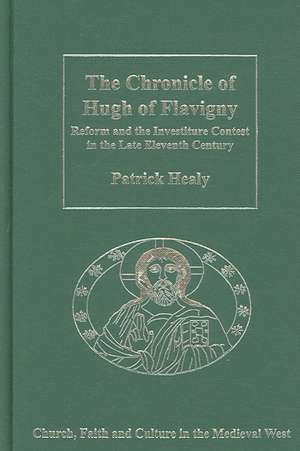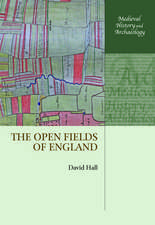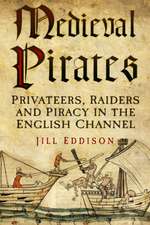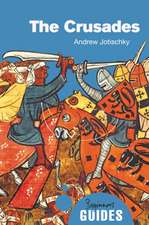The Chronicle of Hugh of Flavigny: Reform and the Investiture Contest in the Late Eleventh Century: Church, Faith and Culture in the Medieval West
Autor Patrick Healyen Limba Engleză Hardback – 28 aug 2006
Din seria Church, Faith and Culture in the Medieval West
- 9%
 Preț: 936.25 lei
Preț: 936.25 lei -
 Preț: 529.38 lei
Preț: 529.38 lei -
 Preț: 341.55 lei
Preț: 341.55 lei -
 Preț: 489.26 lei
Preț: 489.26 lei - 17%
 Preț: 259.98 lei
Preț: 259.98 lei - 18%
 Preț: 1054.71 lei
Preț: 1054.71 lei -
 Preț: 390.46 lei
Preț: 390.46 lei -
 Preț: 469.34 lei
Preț: 469.34 lei - 18%
 Preț: 1054.71 lei
Preț: 1054.71 lei - 18%
 Preț: 1059.45 lei
Preț: 1059.45 lei -
 Preț: 398.18 lei
Preț: 398.18 lei - 18%
 Preț: 1111.51 lei
Preț: 1111.51 lei -
 Preț: 389.38 lei
Preț: 389.38 lei - 26%
 Preț: 764.20 lei
Preț: 764.20 lei - 18%
 Preț: 1071.27 lei
Preț: 1071.27 lei - 18%
 Preț: 1072.88 lei
Preț: 1072.88 lei - 18%
 Preț: 1062.62 lei
Preț: 1062.62 lei - 26%
 Preț: 765.43 lei
Preț: 765.43 lei - 18%
 Preț: 1054.71 lei
Preț: 1054.71 lei - 18%
 Preț: 1054.71 lei
Preț: 1054.71 lei - 25%
 Preț: 826.01 lei
Preț: 826.01 lei - 26%
 Preț: 848.96 lei
Preț: 848.96 lei - 18%
 Preț: 1068.15 lei
Preț: 1068.15 lei -
 Preț: 469.34 lei
Preț: 469.34 lei - 25%
 Preț: 770.26 lei
Preț: 770.26 lei -
 Preț: 389.66 lei
Preț: 389.66 lei - 18%
 Preț: 1054.71 lei
Preț: 1054.71 lei - 28%
 Preț: 823.99 lei
Preț: 823.99 lei - 17%
 Preț: 259.98 lei
Preț: 259.98 lei - 18%
 Preț: 1000.27 lei
Preț: 1000.27 lei - 18%
 Preț: 1065.78 lei
Preț: 1065.78 lei -
 Preț: 489.26 lei
Preț: 489.26 lei - 18%
 Preț: 1000.27 lei
Preț: 1000.27 lei - 18%
 Preț: 1054.71 lei
Preț: 1054.71 lei - 18%
 Preț: 1109.18 lei
Preț: 1109.18 lei - 18%
 Preț: 1057.09 lei
Preț: 1057.09 lei - 18%
 Preț: 1007.36 lei
Preț: 1007.36 lei - 16%
 Preț: 251.54 lei
Preț: 251.54 lei - 18%
 Preț: 1119.52 lei
Preț: 1119.52 lei
Preț: 1000.27 lei
Preț vechi: 1219.84 lei
-18% Nou
Puncte Express: 1500
Preț estimativ în valută:
191.40€ • 199.45$ • 158.48£
191.40€ • 199.45$ • 158.48£
Carte tipărită la comandă
Livrare economică 03-17 aprilie
Preluare comenzi: 021 569.72.76
Specificații
ISBN-13: 9780754655268
ISBN-10: 0754655261
Pagini: 276
Ilustrații: map
Dimensiuni: 156 x 234 x 18 mm
Greutate: 0.45 kg
Ediția:New ed
Editura: Taylor & Francis
Colecția Routledge
Seria Church, Faith and Culture in the Medieval West
Locul publicării:Oxford, United Kingdom
ISBN-10: 0754655261
Pagini: 276
Ilustrații: map
Dimensiuni: 156 x 234 x 18 mm
Greutate: 0.45 kg
Ediția:New ed
Editura: Taylor & Francis
Colecția Routledge
Seria Church, Faith and Culture in the Medieval West
Locul publicării:Oxford, United Kingdom
Notă biografică
Dr Patrick Healy is IRCHSS Post-Doctoral Fellow in the Department of History, Trinity College Dublin, Ireland.
Recenzii
'This is an important study, informed by close readings of the Chronicon itself, parallel texts and sources, and a very extensive body of scholarly literature. There is a real sense that no possible source for Hugh's text has been neglected. The analysis is persuasive and challenges readers to rethink ideas of a 'friendship network' and especially the ways in which both texts and intellectual/propagandistic concepts were transmitted in this period, all of which are underpinned by Healy's close reading of the autograph. The study is to be especially commended for its careful balance between the local and broader contexts of reform, both of which informed Hugh's outlook and the text itself... this book is and will be a key study for anyone working on the eleventh-century reform movement, its intellectual underpinnings, and perhaps especially the transmission of ideas, and of canonical and other texts in Western Europe during this period.' Archives ’Healy’s study offers a mine of information about the Chronicon and its author.’ English Historical Review '... une importante contribution à l’histoire de la Querelle des investitures sur le terrain des monastères et des diocèses et non plus seulement vue de Rome; il démontre également la place exceptionnelle tenue par la chronique d’Hugues de Flavigny dans l’histoire du conflit entre Église et Empire à la fin du XIe s.' Cahiers de civilisation médiévale
Cuprins
Chapter 1 Introduction; Chapter 2 The Abbey of St-Vanne, Verdun, from its Foundation until 1085; Chapter 3 The Life and Career of Hugh of Flavigny; Chapter 4 The Manuscript of the Chronicon and its Transmission; Chapter 5 Sources of the Chronicon; Chapter 6 Kingship and Tyranny in the Chronicon; Chapter 7 Lay Investiture and Simony: Auctoritas and Consuetudo; Chapter 8 Reforming Attitudes to Ecclesiastical Promotion; Chapter 9 The Chronicon as Polemic;
Descriere
This book is a detailed study of Hugh of Flavigny and his chronicle, which is widely recognised as one of the most important narratives of a crucial period of European history, the Investiture Contest. Hugh's Chronicon is significant in a number of ways: as a unique source-book for some of the most important primary documents (especially papal letters) generated by the Investiture Contest; as a rare autograph manuscript which gives an important insight into contemporary modes of composition and compilation; as an important history of the 'local' effects of the Investiture Contest in the dioceses of Verdun and Autun; and as a striking autobiography of the author, Hugh of Flavigny.










